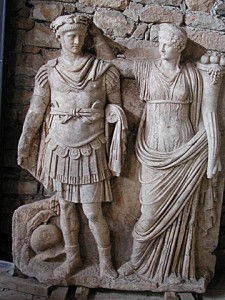 Professor Catharine Edwards, Department of History, Classics and Archaeology, will be presenting Mothers, murderers and mistresses: the empresses of ancient Rome, on BBC4 from Wednesday 29 May, 9pm.
Professor Catharine Edwards, Department of History, Classics and Archaeology, will be presenting Mothers, murderers and mistresses: the empresses of ancient Rome, on BBC4 from Wednesday 29 May, 9pm.
Female members of the imperial family, the wives, daughters – and particularly mothers – of Roman emperors are some of the most colourful characters in Tacitus’ and Suetonius’ accounts of Rome in the early imperial age. Livia, wife of Rome’s first emperor Augustus, and mother of its second – Tiberius, emerges as the lynch-pin of the family – charming, politically adept, devious – and prepared to stop at nothing – including murder – to secure her son’s succession to the imperial throne. Agrippina, sister of the emperor Caligula, wife of Claudius and mother of Nero, outdoes even Livia in her outrageous plotting. She seduces the emperor Claudius, who happens to be her uncle, becomes his wife, then later murders him as soon as her son Nero is old enough to take over. Agrippina, it seems, longs to rule the empire herself. Nero cannot bear his mother’s domineering and eventually has her killed.
Other women, most strikingly Augustus’ only daughter, Julia, and Claudius’ first wife, Messalina, attract attention for their flagrant sexual excesses. One ancient writer describes Julia entertaining her lovers in public in the Roman forum, while Messalina is said to have taken part in a competition with Rome’s leading prostitute and won, satisfying 25 clients in 24 hours – if, that is, we are to believe the scandalized reports of Roman commentators.
Gender and Power in Ancient Rome
I’ve always been interested in the interrelationship between gender and power in ancient Rome. This was a key concern in my first book, The politics of immorality in ancient Rome (Cambridge 1993). It’s also something that drew me to publish a translation of Suetonius’ Lives of the Caesars (Oxford World’s Classics 2000), while Tacitus’ characterization of Agrippina features particularly in my more recent Death in ancient Rome (Yale 2007). When I was approached by Tom Webber of Hotsauce TV to research and present a three-part series on Roman imperial women I jumped at the chance.
Piecing together the stories of women
The stories of these women, though gripping, are often lost sight of, even when we focus on individual Roman emperors – let alone in studies of military or administrative history. Can we ever hope to recover something of their point of view? Tantalisingly, Agrippina herself wrote an account of her family’s history, which is now lost, though Tacitus drew on it in writing his Annals. What kind of a view of Roman history did this offer? Would it have given us a flavour of what it felt like to be almost at the pinnacle of Roman power, yet always ultimately dependent on the continuing favour of an erratic and perhaps not very bright young man obsessed with music and sex? Agrippina was probably fully justified if she thought she could do a much better job of running the empire than her teenage son.
Another question our series sets out to explore is how much influence these women really had. Fleeting references in ancient literature, as well as texts inscribed on stone, are pieced together to reveal Livia, for instance, getting involved in the affairs of subject communities in the eastern Roman empire, interceding with Augustus on behalf of the islanders of Samos or advising Salome, sister of Herod the Great, on whom she should marry.
Envy or admiration?
The ancient evidence relating to these women is often highly contradictory. One particular challenge we face is explaining the striking mismatch between literary accounts, which so often highlight these women’s shocking excesses, whether of ambition, avarice or sexual desire and, on the other hand, the coins and works of sculpture (such as the relief shown above, in which Agrippina places a wreath on Nero’s head) which seem to recognize their position and influence as completely legitimate. Did Romans – and the inhabitants of the empire more generally – resent these imperial women or admire them – or is the picture more complex? Venerated, envied, viewed with suspicion, feared and sometimes hated they certainly provoked strong emotions.
Above all we need to be cautious about taking ancient accounts of their scandalous misbehavior, all those stories of adultery and poisoning, at face value. The Romans often prided themselves on their rugged masculinity; political power in Roman antiquity is characterized as something that is – or ought to be – a masculine preserve. The advent of the principate (as ancient historians term the monarchical regime which succeeded the Roman republic) brought significant political change. In a system where power was transmitted through the family, female members of that family came to have enormous importance. Many of the traditional Roman ruling class, the senatorial elite, resented the rule of one family and focused their resentment on the influence of its women. And what better way to undermine the authority of an emperor than to ridicule him for being under a woman’s thumb, whether scheming wife or domineering mother?
Watch a trailer for the documentary, starting on 29 May 2013, 9pm, BBC4:
